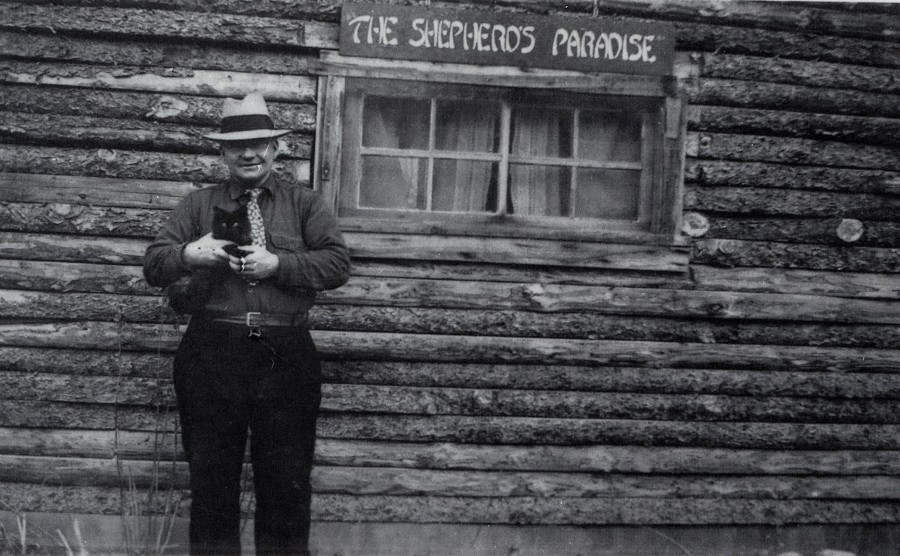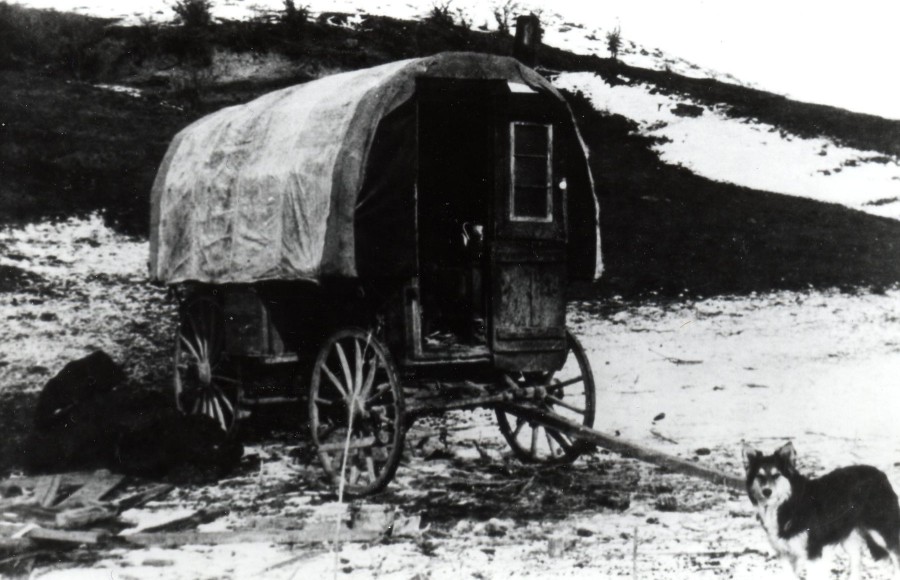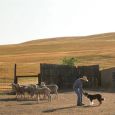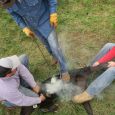The Gift of South Dakota
Subscriptions to South Dakota Magazine make great gifts!
Subscribe today — 1 year (6 issues) is just $29!
A Sheepherder Named Gilfillan
 |
| Archie Gilfillan rented a log cabin in Spearfish which he called "The Shepherd's Paradise." |
Archie Gilfillan was South Dakota’s sagebrush philosopher. His prairie wit entertained people in the ranching areas of Montana, North Dakota, Wyoming and South Dakota through the Great Depression.
He talked at colleges, high schools, livestock conventions and smoky bar rooms, giving neighbors and friends a chuckle or two during hard times. Public speaking seems an unlikely sideline for a man who spent 20 years as a lonely sheepherder in northwest South Dakota.
Perhaps even more ironic, however, is the fact that Gilfillan authored one of the funniest and most introspective works on early 20th century West River life. Sheep: Life on the South Dakota Range remains in print even today. Stories from the book are told and retold, especially in the bar rooms and kitchen tables of Harding County where he spent his sheepherding days.
Archer Gilfillan was born Feb. 25, 1886, in White Earth, Minn., where his father served as an Episcopal missionary. In 1898 the family moved to Washington, D.C., after Archie’s father suffered a nervous and physical breakdown.
During his teenage summers, Archie worked on farms in Virginia, Massachusetts and Pennsylvania. He grew to like the farm animals, especially sheep. He claimed to have bought a sheep for $3 when he was a youngster and the animal was sold for $6, along with the wool, just one year later. He invested the $6 in three more ewes and sold them for $18.
Years later he wrote, “While I had never been especially good at mathematics, it seemed to me that 100 percent a year was a pretty good return on an investment and that if I could keep it up regularly I ought to be worth quite a bit some day. So I bought as many ewes as I had money for, and left them, supposedly, on shares, with a neighboring farm woman who had a few sheep of her own.”
But the woman mailed him a check for just $10, claiming the pasture bill ate up the rest of his investment. “I learned about women from her,” he wrote. “I was wiped out. But while women are men’s ineradicable weakness, sheep are not; and it was many a year before I again took up the trail of the Golden Hoof.”
He started high school in 1902, two years late because he suffered from typhoid fever and traveled Europe for two years with two aunts while he recovered.
He wore glasses and was short and stout. Sensitive about his height and roly-poly appearance, he avoided sports. An inferiority complex seemed to haunt him all his life, but he maintained a friendly, good-natured personality.
Archie graduated from high school in 1906 as an honor student. He started at Amherst College but transferred to the University of Pennsylvania at Philadelphia. He graduated Phi Beta Kappa with an emphasis in Latin and Greek in 1910. Archie enjoyed debate and excelled in most of his courses.
After graduation he followed his dream west to South Dakota where he worked on a ranch near the Black Hills. Big cattle ranches of the free grass era had just gone out of business and little people with big dreams were arriving to homestead. Archie caught the “free land” bug and decided to homestead in Harding County near Slim Buttes. He raised sheep but never seemed to find the rhythm of buying low and selling high. In three years he gave up ranching and decided to follow in the ministerial footsteps of his father and grandfather.
For three years he attended Western Theological Seminary in Chicago, an Episcopalian institution. On the day before graduation he had a change of heart and dropped out of school to join the Catholic Church.
 |
| Gilfillan’s sheepherder’s wagon is now on exhibit at the Dakota Discovery Museum in Mitchell. |
Archie returned to Harding County. For two years he herded sheep on ranches with small flocks. In 1916 he hired out to Almon “Al” Dean and herded sheep for him until 1932.
During those 16 years, Gilfillan developed a problem with alcohol. When Dean caught him in a wagon drunk, he moved him to the home ranch to do chores. Such confined quarters were unbearable to Archie and he took another herding job at a neighbor’s ranch in the spring of 1933. He soon retired from the sheep business and rented a log cabin in Spearfish. He named the cabin Shepherd’s Paradise.
He had kept a diary in cipher, a system of secret writing based on a key, for eight years and four months starting in December of 1924 when he was 38. During those years he filled 9,010 pages of standard letter-size paper.
The diary was later transcribed by John Jenson, rare book librarian at the University of Minnesota, after Emily Heilman, Archie’s sister, donated the work to the university.
Gilfillan claimed that he never failed to make a daily entry in his diary but some days are missing. Perhaps the wind grabbed a page occasionally when the sheep wagon door opened. Some of the jottings were reportedly not meant for public consumption because they contained juicy gossip about the pioneering families of the northwest.
Information from the diary filled the pages of his book Sheep, which was published in 1929 by Little and Brown Co. after being rejected by several other publishers. It sold for $2.50. Gilfillan received 10 percent and he voiced the writer’s lament that the publisher gets 80 percent while the writer gets peanuts.
Gilfillan said his first royalty check should have been about $600 but he gave away too many books so the publisher subtracted $200.
In his diary, he was extremely frank about his day-to-day life. His book reveals a sheepherder’s western humor and philosophy that can only be fully appreciated by readers who understands sheep or people.
He never stopped learning, and he devoured books. At one time, he subscribed to 15 magazines and claimed to have a library of 500 books. “Even if a herder does not particularly care for reading, he will be driven to it in self-defense,” he wrote.
Reading was more than a pastime, he quipped. “If the herder on an intensely cold day can get interested in a good story, it will serve to take his mind off his other troubles, such as how much colder his feet will have to get before they crack and break off, and whether the sun is really standing still, or whether that is merely an optical illusion.”
Gilfillan wrote in an earthy, irreverent style. He detested arrogance in writing or talking. In reference to Mary Austin’s book, The Flock, he said that she never used a word in its right meaning if she could distort another to take its place. Of course while writing a book about sheep it would be impossible to avoid profanity. If it answered a question or released pent up frustration, Archie could curse but he never condoned vulgarity in any form.
Sheep was reprinted in 1930, 1936, and 1956 and 1957. Gilfillan complained that he never did find out how many copies were sold in the first two printings. In recent years, it has been reprinted by the Minnesota Historical Society Press.
During his years as a sheepherder, Gilfillan suffered many hardships including lightning, cloud bursts, floods, blizzards, rattlesnakes, wolves, coyotes and two-legged camp robbers. Once, as a tornado approached, he was forced to seek shelter in an old well.
Gilfillan had other challenges in life. Card games, especially poker, were his downfall. He liked to socialize and always found an excuse for a drink. Unfortunately, he never seemed to realize that cards and whiskey did not mix. Al Dean let him borrow on future wages to pay off his debts and the Ivy League sheepherder was always overdrawn.
In 1924 Gilfillan gave a talk to the Woolgrowers Association at Helena, Montana. He caught everyone by surprise with an outstanding, well-informed speech he called The Secret Sorrows of a Sheepherder. He never gave his name so he remained unknown for several years in spite of efforts in Montana to identify him.
His three secret sorrows were sheepmen who didn’t know as much about sheep as the herder, cowboys who got all the glory while the sheepherder was looked down upon, and women who wanted to be substitute sheepherders.
He maintained that women were ill-equipped for the occupation. “The truth is that in many respects they are unsuited to the work,” he wrote. “With no more than a discreet allusion to the three quickest means of communication, can you really picture a woman engaging in an occupation which would leave her more or less in the dark with regard to the doings of even her immediate neighbors?”
Language would be an even bigger problem, he thought. “There are frequent occasions in herding when the feelings seethe in the herder’s bosom like white-hot steam in an engine boiler. His anguish finds vent in language that he has picked up at odd times around garages, stables, poker games and from autoists who were changing tires. Women, not having frequented these places, would be at a distinct disadvantage.”
Gilfillan liked women. He just didn’t think they should be sheepherders. But he disdained cowboys. “Is there any intrinsic reason why the man who takes care of cattle should be a romantic, half-mythical figure, while the man who takes care of sheep is either a joke or anathema?” he wrote in Sheep.
Gilfillan argued that the sheepherder was superior to the cowboy because he was his own boss most of the time while the cowboy “may be able to carry more than one day’s orders in his head, but he seldom has the opportunity of proving it.”
In spite of that, he acknowledged that, “every kid in the range country looks forward to the day when he can get hold of hair pants, a ten-gallon hat, a Miles City saddle and a pair of big spurs, and then cultivate a bow-legged walk and hire out to a cattleman.”
Gilfillan gave a commencement address at Buffalo on May 22, 1930, and the graduating seniors enjoyed his sharp, western wit. He quipped, “I have the suspicion that Prof. Chanson has asked me to appear before these graduates to serve as a warning, so that they can see what may happen to them if they do not watch their step and be just a little bit careful.”
The herder-author often referred to him self as a Phi Beta Kappa gone wrong. The Gilfillans were a literary family. Archie’s grandfather wrote The Origin of Sin. He surmised that it was not a commercial success because people are more interested in their daily practice of sin than finding its origin.
Archie’s father, a minister like his grandfather, wrote an unsuccessful book trying to restrain people from seeking what they wanted. S.C. Gilfillan, Archie’s brother, wrote books, too, and his nieces also enjoyed writing.
At Spearfish, Gilfillan became a freelance writer for several South Dakota newspapers but money was scarce. In 1936 he published A Shepherd’s Holiday. It was 52 stories collected from his newspaper ar ticles and published at Custer.
Late in life, he also authored A Goat’s Eye View of the Black Hills, with assistance from longtime friend Hoadley Dean of Rapid City. He retold many legends of the South Dakota mountain towns, adding his personal perspectives and a big dose of his dry humor.
He also explained in the book why he remained a bachelor. “You profess sincere and unbounded admiration for the beauties of the opposite sex and you practically lay your heart at their collective feet; and then you meet some individual who combines the poorer qualities of a mama wildcat and a bitch wolf, with a voice like a buzz saw, the temper of a slapped hornet, and a disposition that would curdle the milk in four adjoining counties. And then you have to revise your opinion of the sex all over again –– and downward.” In short, he never met a woman he liked who would have him as a husband.
The Great Depression spread across South Dakota before local writers heard about the Federal Writer’s Project (FWP) being promoted by Eleanor Roosevelt. Unemployed writers were hired to inter view old-timers, search files and records, collect folklore, and preserve the history, culture and contemporary life of American communities.
The project was considered a work program and no one expected it to produce anything of lasting value. Today, the books and material these men gathered and wrote are valuable treasures. M. Lisle Reese, a talented Montana native, was hired as director of South Dakota’s Federal Writers Project and he hired Gilfillan as his assistant.
He stayed until the project ended in the spring of 1942. For the next seven years he worked at the Black Hills Ordinance Depot at Provo (Igloo). He wrote for the Igloo Magazine, did clerical work and served as librarian. When that job ended in 1949 he moved to Deadwood. In failing health, he lived in retirement.
When Gilfillan retired to Deadwood, he stayed at the Wagner Hotel. He usually sat on a straight back chair and read a book or walked along Deadwood streets, visiting with his neighbors.
While enjoying a walk on December 17, 1955, he dropped to the sidewalk. He had moved on to greener pastures.
Family and friends buried the old sheepherder at Belle Fourche. But Gilfillan’s bad luck continued even in death. They buried him beside two great cowboys, Paul Bernard and Joe LaFlamme.
EDITOR'S NOTE – This story is revised from the Nov/Dec 1996 issue of South Dakota Magazine. Paul Hennessey was teacher, and also worked as a private investigator on the West Coast. Hennessey knew Archer Gilfillan during the sheepherder’s years at Igloo. To order this back issue or to subscribe, call 800-456-5117.










Comments